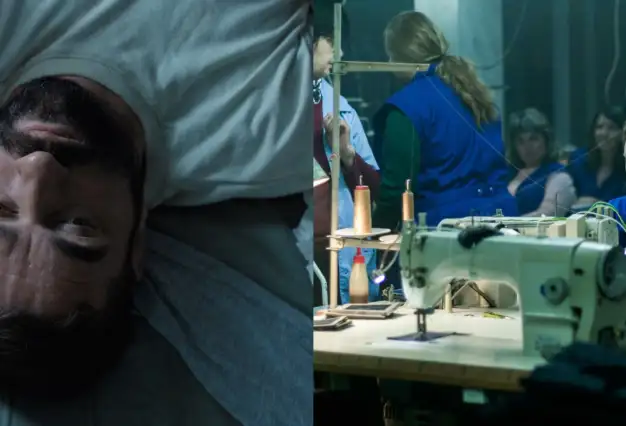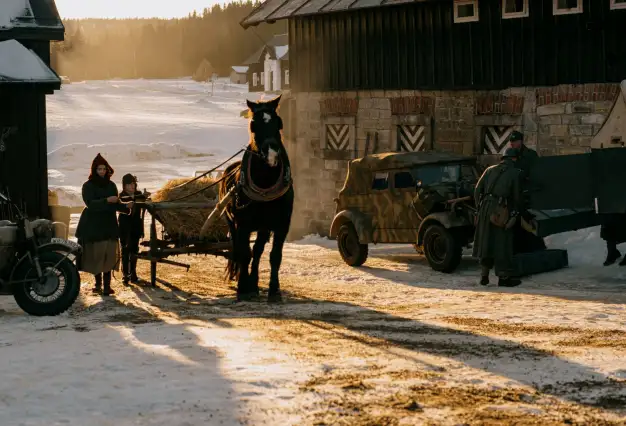
16 July 2025
The literary icon comes alive in Agnieszka Holland’s kafkaesque biopic Franz
The literary icon comes alive in Agnieszka Holland’s kafkaesque biopic Franz

Czech cinema returns to North America’s most prestigious film gathering with a major auteur work that defies biopic conventions and reinvents the cinematic legacy of a literary icon. At the 50th edition of the Toronto International Film Festival (September 4–14, 2025), the only Czech selection, screened in Special Presentations, is also one of its most ambitious: Franz, a kaleidoscopic portrait of Franz Kafka by Oscar-winning Polish director Agnieszka Holland.
by Martin Kudláč
Over the past decade, the Toronto International Film Festival (TIFF) has become a consistent platform for showcasing the expanding international profile of Czech cinema. From Václav Marhoul’s The Painted Bird and Michal Blaško’s Victim to acclaimed shorts such as Daria Kashcheeva’s Daughter or Electra, and Diana Cam Van Nguyen’s Love, Dad, TIFF has regularly featured Czech filmmakers.
The 2024 edition reflected the breadth of Czech creative involvement across formats and genres, with Peter Kerekes’ Slovak-led but Czech-co-produced Wishing on a Star screening in TIFF Docs, and Thomas Vinterberg’s high-profile dystopian series Families Like Ours – partially shot in the Czech Republic with support from Czech Audiovisual Fund and co-produced with Prague-based Sirena Film – selected for the Primetime strand.
That trajectory continues at this year´s TIFF, one of the most important film events in the North America, as Czech cinema returns to the spotlight with the world premiere of Franz, the highly anticipated new feature by Oscar-nominated director Agnieszka Holland. Premiering in the festival’s 50th edition (September 4–14, 2025), Franz represents the latest in a long-standing collaboration between Holland and the Czech film industry, her sixth co-production with the country.
Following the politically charged Green Border (Venice and TIFF 2023), Holland shifts to more intimate historical terrain. Franz, a Czech-German-Polish co-production, brings a formally bold and genre-defying portrait of Franz Kafka. Rather than a conventional biopic, the film takes the shape of a hybrid docudrama, blending fiction, archival material, and stylized reconstructions to explore Kafka’s interior world and enduring relevance.
Holland, who has maintained close ties to the Czech Republic since her formative years at Prague’s FAMU, describes Franz as a “whimsical fictional docudrama.” Rather than presenting Kafka’s life through a conventional biographical structure, the film opts for an episodic, impressionistic narrative, weaving together fragments from Kafka’s fiction, letters, diaries, and historical context. Co-scripted by Marek Epstein, who penned also Holland´s Charlatan, the screenplay deliberately avoids clear linearity, instead constructing a psychological and poetic mosaic that traverses time and space, shifting between early 1900s Prague, pre-war Berlin, and the landscapes of contemporary Central Europe.
“Kafka is not treated here as a museum piece,” says the film´s Czech producer Šárka Cimbalová from production company Marlene Film Production, “but as an unresolved figure whose ideas and fears feel increasingly relevant. His writing, full of ambiguity, contradiction, and open endings, reflects a mindset that mirrors the uncertainties of the present.” Cimbalová previously produced Holland´s biopic Charlatan and co-produced immigration drama Green Border.
This multidimensional approach reflects a wider trend in contemporary European auteur cinema, an embrace of hybrid forms and historically-informed narratives that transcend conventional period drama. For Holland, Franz marks an evolution in style: a looser, more elliptical portrait that blends theatricality with realism, myth with memory.
German actor Idan Weiss leads the cast in the role of the titular protagonist, bringing a contemporary sensibility to a historical figure often portrayed through a narrow existentialist lens. “He was the third actor we saw,” Holland recalls. “He didn’t just resemble Kafka physically—he brought something ineffable, a kind of anachronistic presence that made him feel like he belonged to our time.” Weiss performs alongside a multilingual ensemble cast including Jenovéfa Boková (Tiny Lights) as Milena Jesenská, Peter Kurth (Schmitke, Babylon Berlin) as Kafka’s domineering father, and Sandra Korzeniak (Green Border) as his mother. Notable Czech actors Josef Trojan (Charlatan), Ivan Trojan (The Karamazovs), Katharina Stark (Dead Girls Dancing, The Interpreter of Silence), Carol Schuler (Kids Run), Sebastian Schwarz (I'm Your Man) and Jan Budař (Bethlehem Light) also appear.
Franz was shot over 40 days in spring 2024, with principal locations in Prague, Berlin, and Theresienstadt. Prague plays a dual role in the film, not only as Kafka’s native city, but also as a symbolic and elusive space shaped by memory and architectural transformation. Holland and production designer Henrich Boráros (We Have Never Been Modern) scouted locations that retained traces of early 20th-century character, shooting on iconic sites such as Charles Bridge, Golden Lane, Vyšehrad, and the Faculty of Law. “If I’d made this film in the 1960s, Prague still looked like Kafka’s city,” Holland notes. “Now we had to search for fragments that still held his spirit.”
Cinematography is by Tomasz Naumiuk (Green Border), whose visual style balances realism with expressionist undertones. Editor Pavel Hrdlička (Nightsiren), costume designer Michaela Horáčková Hořejší (Droneman), and composers Antoni and Maria Komasa-Łazarkiewicz (The Glass Room) round out the creative team, many of whom are long-standing collaborators in Holland’s recent work.
The film is backed by a comprehensive international co-production framework, reflecting the scale and ambition of the project. Franz is produced by Šárka Cimbalová and Agnieszka Holland for Marlene Film Production (Czech Republic), in collaboration with Uwe Schott and Jorgo Narjes for X Filme Creative Pool (Germany), and Marcin Wierzchosławski and Alicja Jagodzińska for Metro Films (Poland). The production is further supported by a wide network of co-producers and institutional partners, including Barrandov Studio, Czech Television, Telewizja Polska, Canal+, ZDF/ARTE, Czech Anglo Productions, NeoSynCon, and Bac Films.
Financing has been secured from an array of major European and regional film bodies, including Eurimages, the Czech Audiovisual Fund (selective support and production incentives), the Polish Film Institute, Medienboard Berlin-Brandenburg, the German Federal Film Fund (DFFF), Republic of Türkiye Ministry of Culture and Tourism, Prague Audiovisual Fund and film offices of the Pilsen and Ústí nad Labem regions. Bioscop will handle theatrical distribution in the Czech Republic, with the national release scheduled for September 25, 2025.
International sales are managed by Films Boutique, which previously represented Charlatan and Green Border. Pre-sales have already been confirmed in multiple European territories, including France, Germany, Poland, Italy, Spain, or Benelux.
Holland’s Kafka film departs from the traditional biopic framework. It does not seek to explain Kafka’s life or literary output, but instead uses his fragmented worldview as a creative method. “It’s not a film about Kafka, it’s a film through Kafka,” Holland states.




